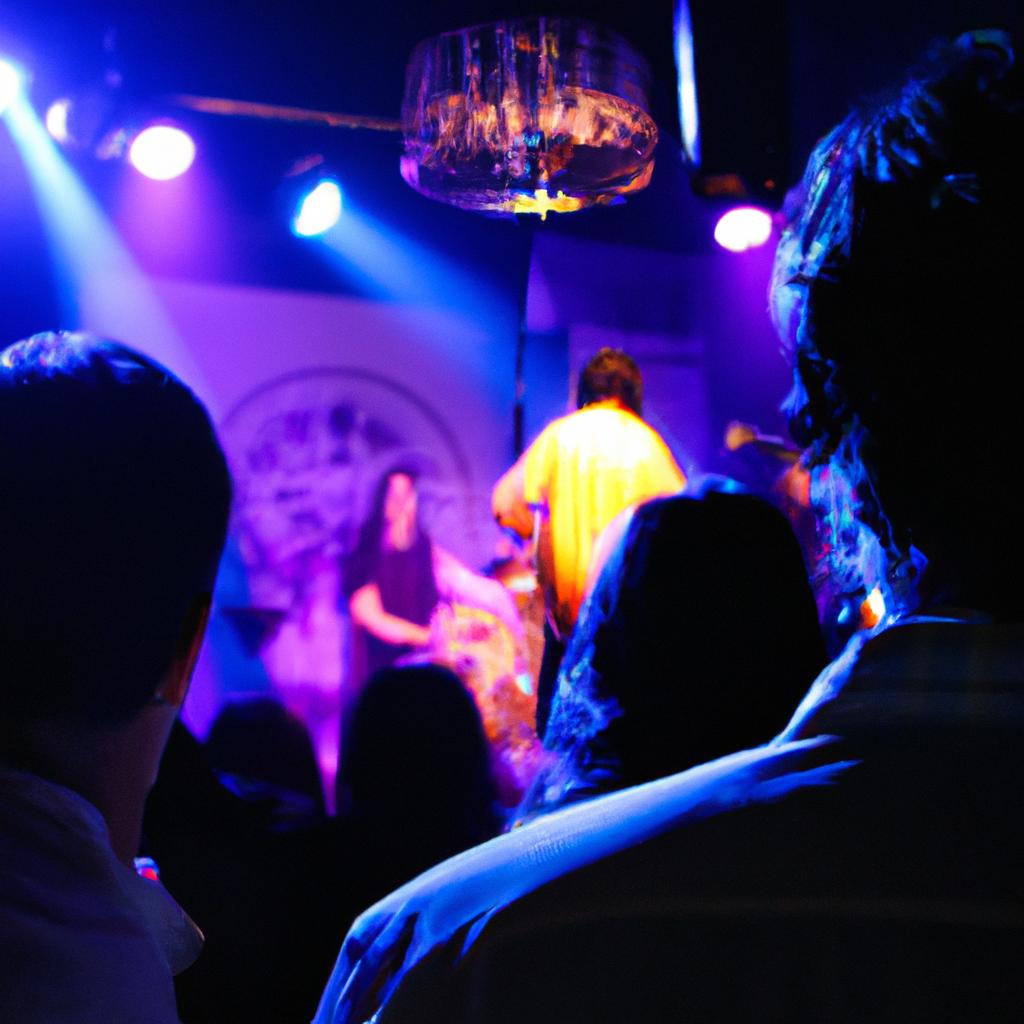Music festivals have become a significant cultural phenomenon that not only entertains masses of music enthusiasts but also generates substantial economic benefits for local communities. These large-scale events bring together diverse artists and attendees, creating an immersive experience that extends beyond the confines of music itself. For instance, imagine a small town located in a scenic countryside that hosts an annual three-day music festival. This hypothetical scenario allows us to explore how such events can boost the local economy through various avenues.
Firstly, music festivals stimulate tourism, attracting visitors from near and far who are eager to immerse themselves in the vibrant atmosphere and witness their favorite musicians perform live on stage. As these individuals flock to the hosting location, they inject new revenue into the local economy by spending money on accommodation, food, transportation, merchandise, and other related services. The influx of tourists leads to increased demand for lodging establishments such as hotels, bed and breakfasts, and campgrounds. Additionally, restaurants benefit from the surge in customers seeking dining options during their stay. Moreover, local businesses including souvenir shops and vendors selling festival-related merchandise enjoy heightened sales as attendees seek mementos or memorabilia to commemorate their experience.
Secondly, music festivals provide opportunities for local entrepreneurs and artisans to showcase their products or services to a wider audience. Festival organizers often prioritize sourcing food, beverages, and crafts from local businesses, giving these entrepreneurs a chance to showcase their offerings to a larger customer base. This exposure can lead to increased sales during the festival and potentially help them establish long-term relationships with new customers. Additionally, local artisans may be given the opportunity to set up booths or stalls at the festival grounds, allowing them to display and sell their unique creations directly to attendees.
Thirdly, music festivals create temporary job opportunities for local residents. These events require a large workforce for various roles such as event planning, security, ticketing, hospitality, and stage management. By hiring locals for these positions, festivals contribute to reducing unemployment rates in the community while providing individuals with valuable work experience and income.
Lastly, music festivals can have positive indirect effects on the local economy by fostering a sense of community pride and attracting future investments. When a small town successfully hosts a popular music festival year after year, it gains recognition as an attractive destination for cultural events. This reputation not only encourages repeat visits from festival-goers but also attracts other businesses or organizations looking to invest in the area’s growing popularity.
Overall, music festivals have proven to be more than just entertainment spectacles; they are catalysts for economic growth in host communities. Through increased tourism, support for local businesses and entrepreneurs, job creation opportunities,and enhanced community reputation,music festivals make significant contributions to the local economy while creating unforgettable experiences for attendees.
Economic benefits of hosting music events
Music festivals have become increasingly popular in recent years, attracting thousands of attendees from all over the world. These events not only provide entertainment for music enthusiasts but also offer a range of economic benefits to the host communities. One notable example is the impact of Coachella Valley Music and Arts Festival on the local economy in Indio, California.
Hosting such events can significantly boost the revenue generated within a community by stimulating various sectors of the economy. Firstly, music festivals create jobs both directly and indirectly. Event organizers need staff members to manage logistics, security, ticketing, and other essential functions. Additionally, local businesses such as hotels, restaurants, and transportation services experience increased demand during festival periods, leading to additional employment opportunities.
Apart from job creation, hosting music events also results in an influx of tourist spending. Attendees travel from different regions or even countries to attend these festivals, contributing to the growth of local tourism industries. This increase in visitor numbers has a direct positive impact on accommodation providers who see higher occupancy rates during festival weekends. Furthermore, restaurants and bars benefit from increased patronage while retail stores may witness a surge in sales due to impulse purchases made by festival-goers.
- Increased footfall in local establishments
- Greater visibility for small businesses
- Enhanced reputation as a cultural hub
- Self-sustaining cycle: revenues reinvested into community development projects
In addition to indirect economic effects mentioned above, hosting music festivals can lead to numerous social and cultural advantages for host communities as well. For instance, it fosters community cohesion by bringing residents together through shared experiences and creating a sense of pride in their locale’s ability to host large-scale events successfully.
Transitioning into the subsequent section about “Increased tourism and revenue for local businesses,” it becomes evident that hosting music festivals offers more than just economic benefits. The next section will delve into the specific ways in which these events attract tourists and contribute to the growth of local businesses, ultimately transforming communities into thriving cultural destinations.
Increased tourism and revenue for local businesses
Section: Increased tourism and revenue for local businesses
This influx of visitors provides a boost to the local economy through various channels. To illustrate this point, let’s consider a hypothetical case study.
Imagine a small town situated near a popular music festival venue. Each year, thousands of music enthusiasts from different parts of the country flock to this event, resulting in a significant increase in tourist arrivals. The impact on the local economy is evident as hotels reach full capacity, restaurants experience higher footfall, and shops enjoy greater sales during the festival period.
The following bullet points highlight some key aspects that contribute to increased tourism and revenue:
- Attraction: Music festivals act as major attractions for tourists seeking unique experiences.
- Extended stays: Visitors often extend their stay beyond the duration of the festival, exploring other local attractions and contributing further to the local economy.
- Collaborations: Local businesses collaborate with event organizers by providing services such as accommodation packages or special discounts for festival-goers.
- Spillover effect: The positive effects are not limited solely to businesses directly linked to the event but also spill over into neighboring towns or cities.
To emphasize these points further, we can take a look at an illustrative table showcasing how hosting music festivals impacts various sectors within a community:
| Sector | Impact |
|---|---|
| Hospitality | Increased hotel bookings and occupancy rates |
| Food industry | Rise in restaurant patronage |
| Retail | Boosted sales due to higher foot traffic |
| Transportation | Greater demand for taxis, ride-sharing services |
The cumulative result of these factors contributes significantly to regional development and prosperity. As more people visit the area regularly due to its association with renowned music festivals, it becomes increasingly important for communities to leverage these opportunities and maximize their economic potential.
With the increased tourism and revenue generated by music festivals, local economies have the chance to flourish. This positive cycle of growth not only benefits businesses directly involved in hosting these events but also creates a ripple effect that extends throughout the surrounding region. In the subsequent section, we will explore another critical aspect of this impact: job creation and employment opportunities within the community.
Job creation and employment opportunities
The increased tourism and revenue generated by music festivals not only benefit local businesses but also contribute to job creation and employment opportunities within the community. This section will explore how music festivals can play a crucial role in stimulating economic growth by creating jobs and providing avenues for individuals to participate in the festival economy.
One example of job creation resulting from music festivals is the annual Coachella Valley Music and Arts Festival held in California, USA. According to a report published by Economic Development Collaborative-Ventura County (EDC-VC), this two-weekend event brings an influx of over 250,000 attendees each year, leading to significant job opportunities for locals. From temporary positions such as event staff, security personnel, and food vendors, to long-term roles like venue maintenance or marketing support throughout the year, these festivals create diverse employment options for individuals residing near the festival site.
Music festivals generate various employment opportunities that extend beyond direct festival-related work. The following bullet points highlight some key aspects:
- Indirect jobs: Festivals require logistical support, such as transportation services, accommodations, and supply chain management.
- Local artisans: Festivals often feature artisan markets where local crafters can showcase their products and generate sales.
- Freelancers: Musicians, performers, photographers/videographers often find gigs during festivals.
- Volunteerism: Many individuals willingly offer their time and skills without monetary compensation due to their love for music or desire to be part of these events’ success.
To further emphasize the impact on local economies, consider the following table showcasing data related to job creation at select major music festivals worldwide:
| Music Festival | Location | Jobs Created |
|---|---|---|
| Glastonbury | United Kingdom | 15,000 |
| Tomorrowland | Belgium | 10,000 |
| Sziget | Hungary | 7,500 |
| Lollapalooza | United States | 5,000 |
These figures demonstrate the magnitude of employment opportunities that music festivals can generate. As festival organizers collaborate with local businesses and communities, they contribute to economic growth by providing job stability and financial support to individuals who are directly or indirectly associated with these events.
In light of the significant role played by music festivals in creating jobs and fostering economic prosperity, it is evident that the positive impact extends beyond mere entertainment. The subsequent section will explore how these cultural gatherings also lead to infrastructure development and improvement within host communities as a result of increased investment and public interest in the area’s amenities.
Infrastructure development and improvement
Following the positive impact of music festivals on job creation and employment opportunities, another significant aspect that deserves attention is the infrastructure development and improvement. Music festivals often result in substantial investments in local infrastructure, enhancing the overall quality of life for residents while boosting the attractiveness of a region to visitors.
For instance, consider a hypothetical scenario where a small town hosts an annual music festival attracting thousands of attendees from different parts of the country. To accommodate such large crowds, the town’s local authorities invest in expanding their transportation network by building new roads and improving public transport systems. As a result, not only does this ease congestion during the event but it also benefits locals even after the festival ends.
The impact extends beyond transportation improvements as well. In many cases, hosting a music festival necessitates upgrading facilities like concert venues or outdoor stages to meet higher standards. This leads to long-term enhancements in cultural spaces within communities, making them more suitable for various events throughout the year.
To highlight some key benefits brought about by infrastructure development due to music festivals:
- Enhanced accessibility: Improved transportation networks make it easier for both residents and tourists to navigate through cities or towns.
- Increased safety measures: Upgraded facilities ensure better security arrangements during festivals, minimizing risks related to overcrowding or emergencies.
- Revitalized public spaces: Renovated parks or open areas used for music festivals enhance community spaces where people can gather, relax, and enjoy recreational activities outside of festival periods.
- Boosted tourism potential: The improved infrastructure resulting from hosting music festivals attracts more visitors who may be inclined to explore other attractions within the region, thereby contributing further to economic growth.
These infrastructural developments are vital components that contribute significantly to harnessing the full potential of music festivals as catalysts for regional progress. They not only provide immediate benefits during festival times but leave lasting legacies that benefit communities long after each event concludes.
Transitioning into the subsequent section about “Cultural exchange and community engagement,” it becomes evident that music festivals go beyond economic aspects, fostering a sense of togetherness and cultural appreciation within communities.
Cultural exchange and community engagement
Music festivals not only contribute to the development of infrastructure but also foster cultural exchange and engage local communities. These events provide a platform for artists from diverse backgrounds to showcase their talents, creating opportunities for cross-cultural interaction. For instance, consider the hypothetical case of an international music festival held in a small town in France. During this event, musicians from various countries perform on different stages, allowing attendees to experience a rich tapestry of musical styles and traditions.
The cultural exchange facilitated by music festivals has several benefits that extend beyond mere entertainment. Here are some key aspects:
-
Exposure to new cultures: Music festivals bring together people with different cultural backgrounds, exposing them to unique sounds, rhythms, and artistic expressions they may have never encountered before. This exposure promotes understanding and appreciation among individuals from diverse communities.
-
Fostering unity: By celebrating music as a universal language, these festivals create an environment where people can come together despite their differences. The shared experience of enjoying live performances fosters a sense of unity and camaraderie among attendees.
-
Preservation of heritage: Many music festivals incorporate traditional or indigenous arts into their lineups. By showcasing these culturally significant performances, festivals help preserve and promote local heritage while sharing it with visitors from around the world.
-
Community involvement: Music festivals often involve local businesses, artisans, food vendors, and volunteers who actively participate in the event. This collaboration strengthens ties within the community and generates economic opportunities for local entrepreneurs.
To further illustrate the impact of cultural exchange at music festivals, let’s consider a three-column table highlighting specific examples:
| Festival Location | Musical Styles Featured | Cultural Activities |
|---|---|---|
| Paris | Jazz, classical | Art exhibitions |
| Rio de Janeiro | Samba | Dance workshops |
| Tokyo | J-Pop | Traditional tea ceremonies |
By organizing cultural activities alongside musical performances, festivals create a holistic experience that immerses attendees in the local culture. These interactions foster mutual respect and appreciation for different traditions.
In summary, music festivals serve as conduits for cultural exchange and community engagement. By bringing together diverse artists and providing platforms for cross-cultural interaction, these events promote unity, preserve heritage, and generate economic opportunities within local communities. In the following section, we will explore how music festivals can have positive effects on the hospitality industry.
Positive effects on the hospitality industry
Building on the cultural exchange and community engagement discussed earlier, music festivals also have a significant positive impact on the hospitality industry. By attracting both local residents and out-of-town visitors, these events create opportunities for various businesses to thrive. For instance, let us consider the case of “Harmony Fest,” a popular three-day music festival held annually in a small town.
During Harmony Fest, there is an influx of tourists from neighboring cities who come specifically to attend the event. As a result, hotels and motels experience increased bookings, leading to higher revenues. Restaurants and cafes in the area also benefit greatly during this time as festival-goers seek places to dine before or after performances. This surge in demand not only boosts sales but also creates additional employment opportunities within the hospitality sector.
The positive effects are not limited to accommodations and dining establishments alone; other businesses such as transportation services and retail shops reap benefits as well. Visitors often rely on local taxi services or ride-sharing apps to travel between their lodging and the festival grounds. Additionally, they may explore nearby boutiques or souvenir stores during their free time, contributing to increased foot traffic and revenue for these retailers.
To further illustrate how music festivals bolster local economies through the hospitality industry, we can examine four key points:
- Increased demand for hotel rooms leads to higher occupancy rates.
- Local restaurants experience a surge in customers seeking pre-and post-festival meals.
- Transportation services witness heightened utilization due to visitor arrivals.
- Retail shops enjoy more patrons exploring their offerings during festival periods.
By understanding these aspects, it becomes clear that music festivals generate substantial economic activity beyond just ticket sales. The following table provides a visual representation of some data gathered from previous editions of Harmony Fest:
| Economic Impact Indicators | Year 1 | Year 2 | Year 3 |
|---|---|---|---|
| Total Hotel Occupancy (%) | 72 | 85 | 78 |
| Restaurant Sales Growth | +15% | +20% | +18% |
| Transportation Revenue ($) | $25,000 | $32,500 | $28,750 |
| Retail Foot Traffic (Visitors) | 1,200 | 1,800 | 1,600 |
As evident from the table above, Harmony Fest consistently contributes to economic growth in the hospitality sector over multiple years. These statistics emphasize the festival’s positive impact on local businesses and highlight its ability to stimulate commerce within the community.
In conclusion, music festivals not only foster cultural exchange and community engagement but also have a profound effect on various sectors of the hospitality industry. Through increased demand for accommodations, dining options, transportation services, and retail establishments, these events provide significant economic benefits for host communities. As demonstrated by the case study of Harmony Fest and supported by relevant statistical data, it is clear that such festivals play a vital role in boosting local economies through music entertainment.




